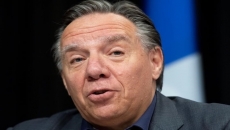The Supreme Court of Canada says it will issue its ruling on the fate of the national carbon tax next week.
The court decision expected Thursday will determine the fate of the central pillar of the Liberal climate change plan.
In 2019 Ottawa imposed a price on pollution on provinces without one of their own.
Saskatchewan, Ontario and Alberta all went to court to argue the Greenhouse Gas Pollution Pricing Act was unconstitutional because Ottawa was stepping into provincial jurisdiction.
In 2019, appeals courts in Saskatchewan and Ontario determined the policy was constitutional, while in February 2020 the Alberta Court of Appeal said it was not.
The cases were all appealed to the Supreme Court, which heard the cases together in two days of hearings last September.
Environment Minister Jonathan Wilkinson said late last year he was confident the court ruling would go the government's way.
"We remain very confident in our legal position. We have been for some time," he said in an interview with The Canadian Press in December.
"As you know, we've won two out of three of the cases at the provincial level and we remain confident that we will win in the Supreme Court."
Josh Ginsberg, a lawyer with Ecojustice, says the ruling will decide if Canada can have a national approach to combating climate change or if it must be left up to each province.
"This is a very big deal," said Ginsberg.
"It'll be much more difficult for Canada to meet its climate targets, if we can't ensure that there's national carbon pricing," he said.
Currently the national carbon price on input fuels applies in Alberta, Saskatchewan, Manitoba and Ontario. All other provinces have a carbon-pricing system Ottawa deems to be the equivalent or better of the federal version.
There is a separate program for big industrial emitters, who pay the price on a portion of their emissions rather than on the fuels they purchase.
The national carbon price is now $30 for every tonne of greenhouse gases produced when a particular fuel is burned. It adds about seven cents to the cost of a litre of gasoline.
Ottawa returns the revenues from the carbon price mainly through tax rebates to families in the provinces where the national price is paid.






